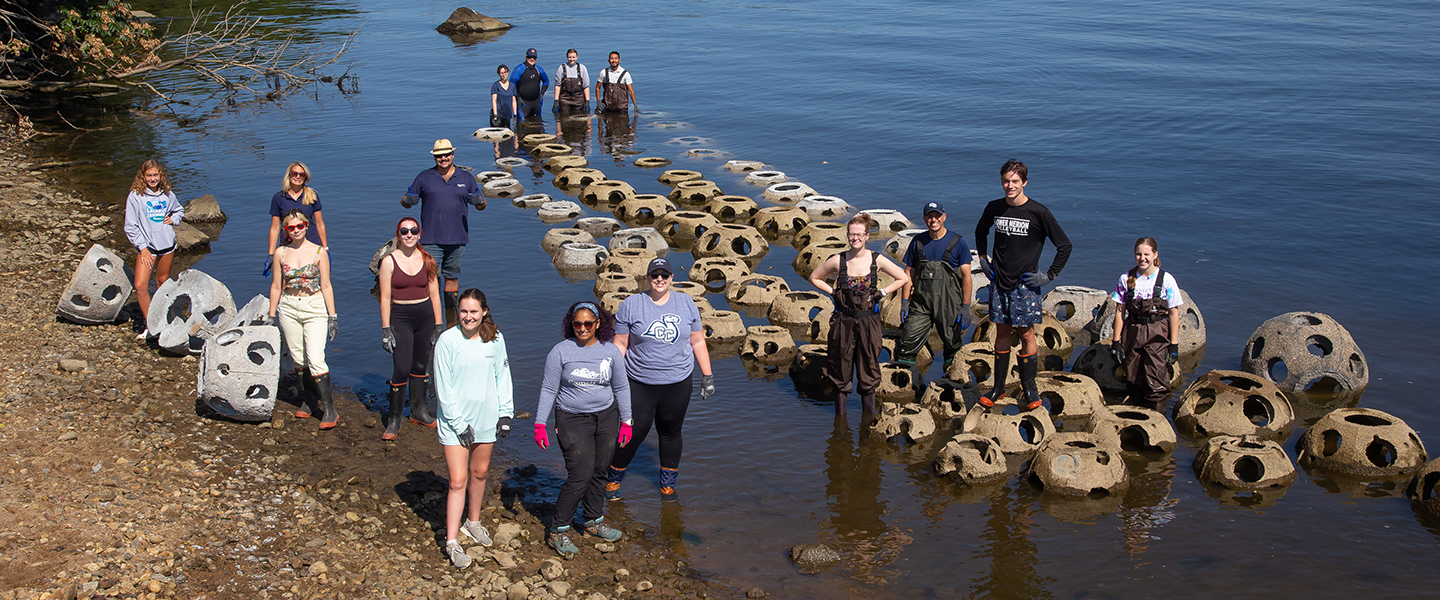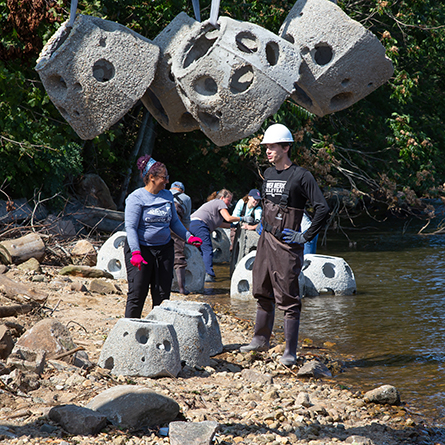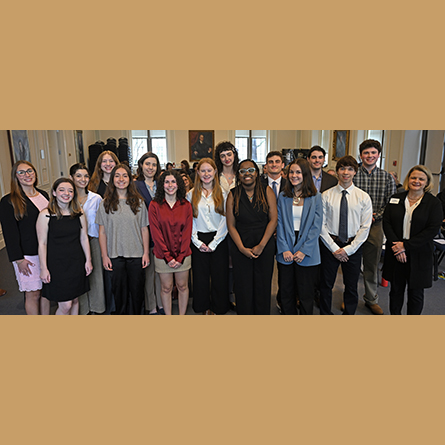
Professor Maria Rosa awarded $177K in grants to expand Thames River Reef Ball Project
Maria Rosa, the George & Carol Milne Assistant Professor of Biology at Connecticut College, has been awarded more than $177,000 in grants to expand an artificial reef pilot program designed to restore natural ecosystems and reverse erosion along the Thames River at the edge of Conn’s campus.
The grants include $86,311.94 from the National Fish and Wildlife Foundation’s Long Island Sound Futures Fund; $50,000 from the Louise H. and David S. Ingalls Foundation, facilitated by foundation president Barbara “Bobbie” Brown ’76; $21,000 from the Bennack-Polan Foundation, facilitated by foundation vice president Dr. Mary Lake Polan ’65 P’02 ’10; and $20,000 from 11th Hour Racing. The funding will allow Rosa and her team to deploy approximately 80 reef balls—hemispheric, concrete artificial reefs pioneered by the nonprofit Reef Ball Foundation—in a highly eroded area of the Thames River.
“Historically, oyster reefs and adjacent marsh cordgrass have provided coastal communities protection from storm surge. But habitat loss and degradation have weakened these essential ecosystem services, making coastal communities especially vulnerable to sea level rise and accelerating coastline loss,” Rosa said.
Instead of hardening shorelines with jetties, seawalls and other techniques that can result in further ecosystem loss and are expensive to maintain, conservationists around the world have been turning to nature-based solutions like reef balls, which mimic natural reefs to create habitats for local fish, crabs and other marine life; promote the growth of plants; and create buffers to tidal and wave activity to minimize erosion.
Reef balls are regularly used in Florida and the Caribbean to restore fish populations, but have only recently been introduced in New England. In 2021, Rosa secured a $10,000 donation from country superstar Kenny Chesney’s No Shoes Reefs initiative and partnered with the Reef Ball Foundation to build and deploy approximately 30 reef balls along the banks of the Thames River on Connecticut College’s campus. Called Camels Reef, the pilot project currently protects 35 linear feet of shoreline, and Rosa’s team has already seen modest sediment accretion and usage of the structures by several specials of fish.
With the new grants, Rosa and her team, including undergraduate student researchers, will significantly expand the protected area to more than 1,200 square feet, with reef balls built “breakwater style” about 200 feet parallel to the shore. The expansion should significantly decrease erosion and promote native marsh growth near the coastline, restoring fringing marsh destroyed by urban expansion and providing connectivity with Mamacoke Marsh, a natural area managed by Connecticut College’s Arboretum.
The project will also further enhance Conn’s recently revitalized waterfront, which serves as a living laboratory for student and faculty research, a premier athletic facility for sailing and rowing and a vibrant recreation space for the entire College community.
Brown, who facilitated the $50,000 grant from her family’s foundation, said she has fond memories of being near the water and spending the night on Mamacoke Island during her own time at Conn.
“I am delighted that there is now access to the shoreline,” Brown said. “The reef ball project has been shown to help preserve and resurrect the tidelands. My family was interested in the preservation of the Thames’ tidelands from an ecological perspective as well as contributing to the support of community activities along the shore.”


